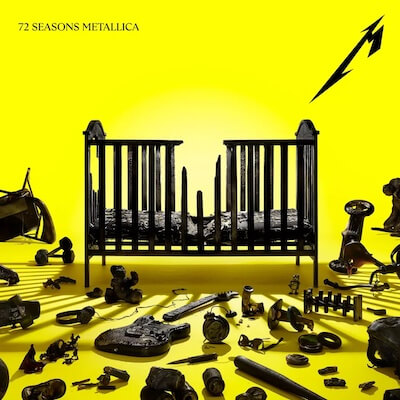Facing Musical Mortality, Metallica Contemplate Youth on 72 Seasons
By not pressing to recapture the past, Metallica sound more liberated than they have in decades.


Metallica’s present-day members are either just on the verge of or just past the age of 60. Ditto for their peers in thrash metal’s so-called Big Four: Anthrax, Slayer and Megadeth. While promoting Metallica’s last album Hardwired to Self-Destruct, drummer Lars Ulrich disclosed that no one knows how much longer the metal giants will be able to hold up the physical end of the bargain. Oddly, this sense of finality never appears, even as a faint shadow, in the 77 minutes of wall-to-wall riffing on the band’s eleventh studio album 72 Seasons.
Mind you, there’s plenty of preoccupation with death—and fatalism, inner turmoil and an all-pervading feeling of woe as well. Additionally, more than half the songs—“Screaming Suicide,” “Inamorata,” “Too Far Gone,” “If Darkness Had a Son,” “Room of Mirrors,” “Crown of Barbed Wire,” “Sleepwalk My Life Away”—peel the curtain back on a particularly naked sense of self-doubt. But it’s not like we haven’t heard Metallica pursue these themes before. The negativity that defines heavy metal has grown so familiar, it’s become a kind of comfort food. And frontman/guitarist James Hetfield has been sandpapering his own skin with pointed introspection since 2003, which we got to see in gory (and often endearing and hilarious) detail in the documentary Some Kind of Monster.
Most surprisingly given the way time is ticking on Metallica’s life expectancy, 72 Seasons brims with a zest for life that verges on joyful, even when the subject matter hews in the opposite direction. And on “Lux Æterna” (Latin for “eternal light”), although Hetfield’s lines about “sonic salvation” and “kindred alliance” are meant as an homage to heavy metal fandom, he captures the sheer thrill of being alive. When Hetfield wails the song’s title, we’re reminded that heavy metal’s signature howl can function as a primal, affirming bark at the moon—a simple, resolute declaration that I am here. And when he repeats “full speed or nuthin’” over an almost cheerful-sounding gallop, we’re reminded that Metallica haven’t sounded this exuberant in 35 years.
-

-

-

-

-

-

-

-

-

-

-

-

-

-

-

-

-

-

-

-

-

-

-

-

-

-

-

-

-

-

-

-

-

-

-

-

-

-

-

-








































